#critical role analysis
Text
Analysis: Essek's Accent As The Shadowhand Fades
I'm watching the Essek Supercut again, and I noticed Essek's accent and when it starts to settle.
Watch the first few clips, until about about 0:4:40
youtube
Mostly this is just Matt settling into Essek's voice, but when he was first introduced, Essek had a very stern authoritative court voice. But once they were in the antichamber together, and Fjord says they need to check their underwear for accidents after that first interaction with the Queen and made him laugh, Essek slips into what we hear as his personal accent.
Essek really did just make up this version of himself to be as successful as everyone pushed him to be, and make really selfish choices to protect that act. But those personas ultimately felt like lies about himself. So what difference does it make protecting it with more lies? Which led himself down some really dark paths until Thw Mighty Nein discovered him and it all unraveled.
Essek is a dramatic theater gay who pulled off a character so well he couldn't stop playing him even when it was turning into a Shakespearean tragedy. Everything he says in these early days is so intensely dramatic and selling his vast accomplishments. Essek is giving them a list of reasons to respect him because he doesn't think his inner self is respectable. Essek always felt like it was the lies people loved and not him underneath, so what would hurt people more would be trying to stop. To be anything less than ruthless.
But this bunch of goofballs, whose very first direct comment to him was a self-depricating joke about being scared, they broke through. And what broke his heart most on that ship, was knowing he'd let them down with those lies. Because he'd let them see his true self, like he hadn't done for anyone in years (decades?), and they loved that one the most. Especially Caleb because they'd shared that instant attraction and interest Essek almost wasn't sure he could feel.
So after he was caught, even if Caleb was telling Essek he could choose to be better, he was obviously hurt and mistrustful and not calling. And feeling like he couldn't go back ate at him.
But then The Mighty Nein call on him again for help with their more dangerous thing ever. These weirdos are going to run headlong into danger not for gain or glory but because it stops someone else making a catastrophic mistake. And they want him to come with them. They want him to show them he's changed. And he has.
And even if they fight it, that attraction is still like magnets. They're so scared of hurting each other again or getting hurt, they can talk in meaningful coded riddles with each other, but not dare cross the threshold where they can hold that pull back. Where they'd have to find out if they enable or temper their worst impulses.
They didn't get there before they parted ways after Aeor. But we know that sometime in the last six months they let themselves pull together. They go back to Aeor to know what it feels like to just be together, the two of them, if no one at all was there. Caleb, down on one knee, holding a magic ring, "[Essek Thelyss], I know we're not relationship people, but will you date me for three months, and then we'll reassess?"
And it worked. Maybe being apart much of the time helps them get perspective on the world outside themselves and the freedom to lead two very different lives. The Essek who visits the man with green beans, no longer sounds quite like the Shadowhand did. He found how to use his power in the world more responsibly, when only a handful of people will hear about it, but they will listen so much closer, and see him more than any accomplishment. With the bustle and fear of the world shut out.
#Critical Role#essek thelyss#the mighty nein reunited#Shadowgast#Critical role meta#critical role analysis#analysis#Youtube
178 notes
·
View notes
Text
WE’RE GOING TO HAVE A NICE LONG TALK ABOUT HOW THE REST OF THE BELL’S KEEP PUTTING ALL THIS PRESSURE ON ORYM FOR BEING “THE BEST OF THEM” WHILE ORYM WAKES UP EVERY MORNING DOUBTING THAT HE CAN EVEN KEEP GOING
#critical role#cr#orym#orym of the air ashari#bell's hells#cr spoilers#critical role analysis#c3ep40#orringinal rambles
142 notes
·
View notes
Text
c3e23: the power of the DM in D&D, or why we are all Laudna right now
last night's episode of critical role really struck home for me how unique D&D is as a format for media, and how the format of Storyteller and Characters draws the audience even further into a story than other forms of media might. It's really beautiful and fucking amazing if you think about it. The potential as a medium to engage the audience while building a world is just unlike anything else.
The biggest thing is this: the power of a DM to make the audience feel exactly what the characters are feeling. Okay, but isn't that the point of a storyteller, you ask? To connect the audience and the story? Sure! But the format of D&D, especially watching D&D, immerses you into a character's mindset like nothing else. Our implicit trust in the DM as our storyteller means we are susceptible to some pretty cool emotional tricks, as evidenced by the end of this episode.
[spoilers for ep 23 of critical role campaign 3 ahead]
Imogen and Laudna are talking, an emotional conversation about Imogen's recent state of mind and Laudna's concern for her. It revolves around the strange pink rock they'd picked up earlier, a rock that seems to draw Imogen to it with promises of safety and comfort. We, as the audience, are aware that there's something not Quite Right with the rock and its power over Imogen. As Laudna continues to ask about it, Matt interjects: each time she pushes a little further, Laudna feels a pulse of...something, something urging her to look at the rock, to examine it further. This happens three times, each time more insistent.
At first I interpret this urge as some sort of...arcane instinct, perhaps. An expression of Laudna's concern for Imogen's well-being, or some part of Imogen not under the spell of the rock reaching out, seeking escape. As I watched, I was impatient for Laudna to listen to this urge. I wanted her to help Imogen, free her from whatever potentially malicious influence was impairing her judgment.
And then Laudna finally convinced Imogen to hand over the rock. She took it in her hand, and Matt's voice turned into the sinister, cruel drawl of Delilah Briarwood.
Delilah, of course, fucks everything up and breaks the rock, draining it of its power and straining Laudna and Imogen's relationship. Especially after Laudna promises wholeheartedly to not do anything to the rock without asking Imogen, the act is a betrayal. Imogen's quiet, heartbroken, "You lied." is just the cherry on top (I could wax poetic about Laura Bailey's acting in this scene, but this post is already getting long).
Laudna is, understandably, horrified. This is our first time seeing true conflict between her and Delilah, and boy is it juicy. Not only is she realizing that Delilah has more power over her than she thought, but her words from literal minutes earlier are coming back to haunt her: where does she end, and where does Delilah begin? Was it her concern and care for Imogen that compelled her to take the rock, or was that all Delilah? Can she trust her own mind, her own feelings?
The great thing about D&D is that we are right there with her. The essential format of D&D is that you trust the storyteller, because they create the story and all you experience in it. We trust Matt implicitly. That's why I was rooting for Laudna to hurry up and investigate that rock, dammit! That's why after the episode, even Marisha said, "He was telling me to do it!" When Matt describes these pulsing urges to take the rock, it was Matt telling us something Laudna felt. We trust Matt. He guides us through this world! His word is law.
And then it turns out his word wasn't his word at all. It was Delilah fucking Briarwood. We are thinking oh shit, what can we trust? at the same moment Laudna is thinking oh shit, what can I trust? Which thoughts are mine and which are hers? As we are questioning our perception of the world, so is she.
That's the unique power of the DM when there's an audience watching your campaign, and that's also just the fucking genius of Matt Mercer. The function of the DM as both voice of god and voice of everything else just sets up these really potent emotional moments that resonate just as strongly for the audience as they do the characters. As the story unfolds, we are just as immersed as any of the players at the table. And I think that's super neat!
#can you tell that i'm also just SCREAMING at the angst this entails?#holy crap do I have thoughts about this.#critical role#critical role spoilers#cr#cr spoilers#laudna#imogen temult#imodna#D&D#cr analysis#critical role analysis#long post
143 notes
·
View notes
Text
Theory: Ludinus is younger than the Calamity, but he did survive Molaesmyr. The source of corruption is said to have come from Caes Mosor. In the Critical Role Campaign 2 Wrap-Up, Matt confirmed the source of corruption was an artifact brought back from Aeor.
So what if this fucker was already studying Aeor and was part of the team that brought something back, and he's rationalizing that their experiments destroyed the city tampering with things they didn't understand with "it's the gods' fault."
He's a historian who got so into his period it took over his whole world view. And doubled down when he made their same mistakes. And instead of learning anything from this, he's just planning on blowing up even more of the world.
35 notes
·
View notes
Text
Because I'm having a bad fucking chronic pain day, and feeling some type of way about it, I'm gonna rant more about Ashton.
Can we talk about how Ashton talks about their pain? Or rather, how he doesn't?
I think Ashton's actually mentioned actively being in pain, like... 3 times in the 86 episodes they've filmed so far? The first time that I can remember is during/immediately after Imogen and FCG delved into their mind and actually experienced what it's like to live in their body.
The second time was in the second episode of the Issylra arc, when the group is packing up to move towards Hearthdell, and Ashton mentions off-hand that he was in pain the night before.
And then the third time was e86. When Ashton collapses after dropping his Titan form, and Orym asks if they're okay, Ashton’s response is along the lines of "I'm fine, it just hurts."
You know what Ashton says a lot more often?
I'm so tired. I'm exhausted. We should really take a rest first. Can we please take a fucking rest now?
It seems subtle at first, but as someone who has chronic pain it hits hard. 'Cause most of the time that's exactly what I say.
Because when you're in pain all the time, the healthy/abled/non-chronic-pain-havers around you don't want to hear about it. It makes them uncomfortable.
Being in constant pain and giving voice to it makes you a whiner. A complainer. A wuss. A flake.
Have you tried yoga? Or drinking more water? Or the current fad diet?
So instead, you learn to allude to it in ways that won’t make the ableds uncomfortable. For me, a lot of the time, that takes the form of:
"I'm just really tired."
So, seeing Ashton pushing themself well past their limits to keep up with their friends and doing what the other Hells want - only to end up completely nerfing themself with 2 points of exhaustion... hits very close to home. Especially seeing most of their friends completely disregard their pain until they couldn't anymore.
Orym is really the only one who consistently shows any consideration for their chronic pain - and the boundaries and limitations that go with it. I only had a handful of friends like that when I was younger, and I treasured every single one of them.
As the kid who always got left behind to walk with a chaperone on field trips because I couldn't keep up with the other kids... it brings back a lot of that frustration and hurt to see it playing out like this for Ashton, but also validates it in a way I'm profoundly grateful for.
Anyway. That's all I have to say about that at the moment. I'll climb down off my soapbox now.
(Really slowly though, 'cause my knees are fucking killing me.)
#i continue to have a lot of feelings about Ashton#i'm in a lot of pain right now#and i'm big mad about it#taliesin jaffe is so good at representation#ashton greymoore#cr3#critical role#critical role spoilers#cr3e86#chronic pain#meta#character analysis#long post
410 notes
·
View notes
Text
okay. i mean this with the utmost affection. but. while imogen and laudna telling each other "im you're anchor. you're my tether" as reassurance about going "dark" or giving into the lure of power is very meaningful and important. it also kind of struck me like. hey wait one of you anchoring the other. fine. possibly-functional. but doesnt BOTH of you tethering to each other risk creation of a spinning centrifugal blur whirling down the road to power.
and like yes yes this isnt an original thought and the proper terminology for this is probably like "dual corruption arc" or in CR "i broke the world for you" yes but. i wanted to share the specific imagery my brain provided for this train of thought, which is roughly:
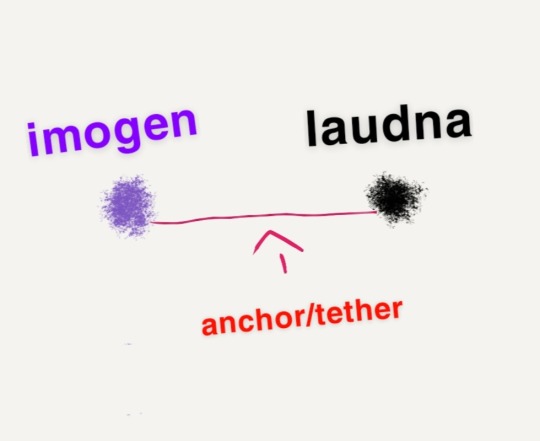
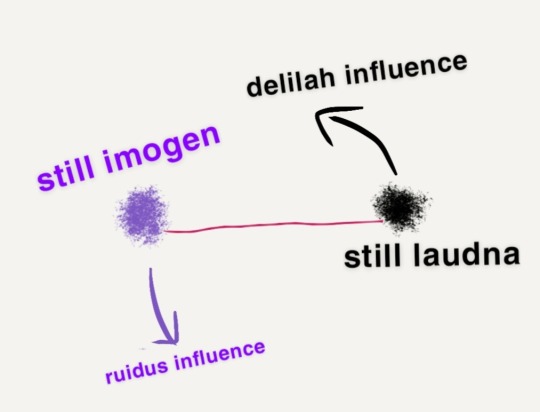
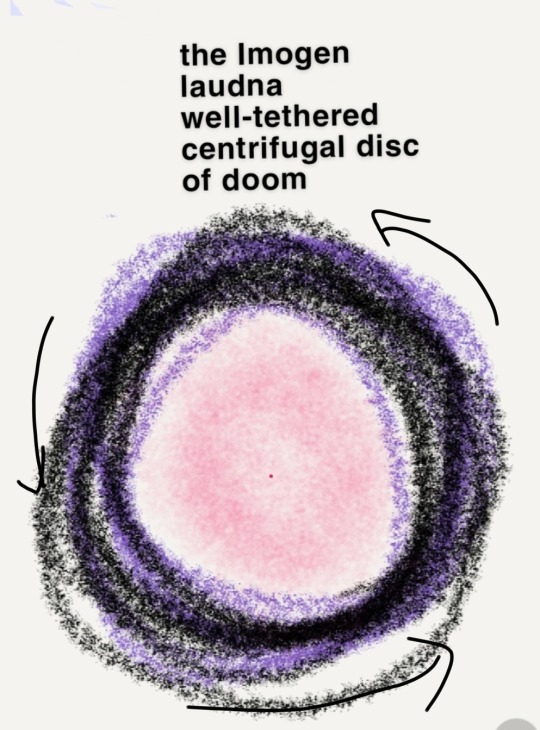
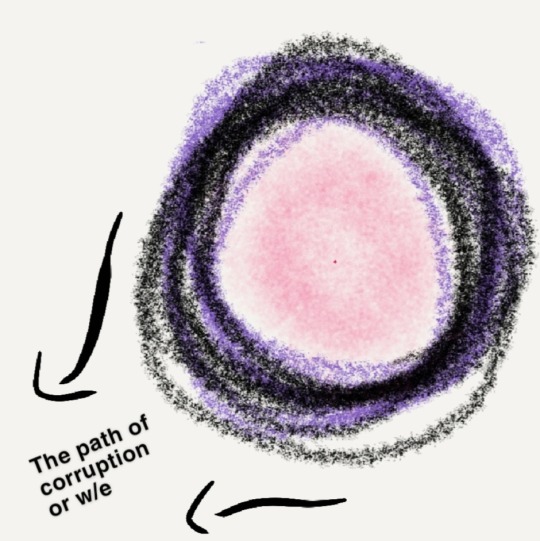
like. thanks. brain. i guess.
bonus thought that popped up when drawing this:
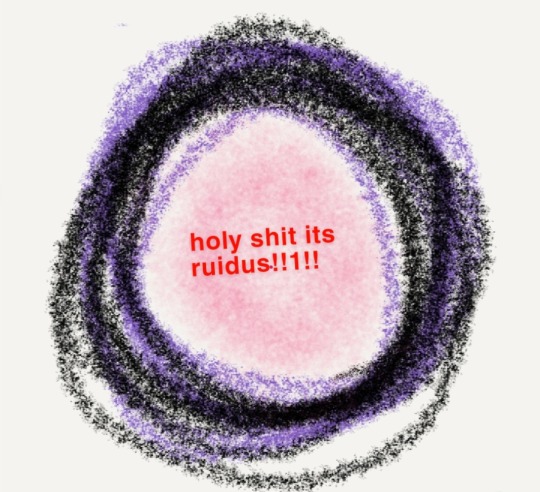
#critical role#imogen temult#laudna#c3e65#cr spoilers#kinda#sorcery pact#LOOK I CAN ABSOLUTELY WRITE MORE THOUGHTFUL IN DEPTH ANALYSIS OF THIS or i can illustrate this and giggle at it#orbs spin fast. hah.#:)#(once i watch. proper meta is coming. this is both a promise and a threat)#i was partway thru making this post when i lost signal for a while and had to ask someone around me whether centrifugal is the outward forc#and couldnt explain why i was asking#the sacrifices i make for cr......#shitpost#spar speaks#imodna#.....?
1K notes
·
View notes
Text

I imagine Essek had one or two record scratch moments in his youth
Such as, alternately,

#I'm on my meme bullshit again#it's shitpost o'clock#note as with my previous Barbie Essek content this is not to say Essek is Barbie unilaterally as there are significant divergences#Barbie wears pink for instance#(jk Essek has a pink umbrella)#but anyway do not flatten the analysis#this is about Essek feeling like the odd man out in his society due to not following the religion#op#essek thelyss#critical role
580 notes
·
View notes
Text
Critical Role's Cameraman
So, Critical Role (@criticalrole) just released their newest opening title sequence, an animated sequence in the same style of Your Turn To Roll and I would be remis as a film nerd to not pick apart every detail.
What fascinates me about this introduction, however, is the camera movement and shot composition. Allow me to explain.
I DONT THINK THERE ARE SPOILERS AHEAD, BUT JUST TO BE SAFE

So, we open with a hand, this is a close up, I don't think that is unobvious.
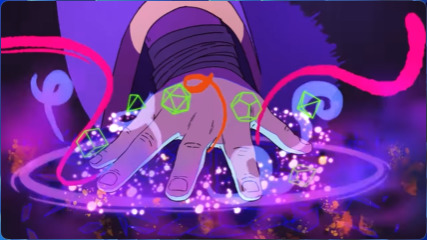
But this stops being a close up rather quickly, before it starts moving away. The shot just gives the hand context, and suddenly you aren't in an extreme close up of a hand, you are in a medium shot of a very large person. Then the camera pans backwards, and you can see villains and places spring up, although the perspective on Matt remains weird. Is he a few metres from you, or a hundred? How big is the Game Master here? There's a sense of mystery, of incomprehension. This is setting up some cosmic horror shenaniganry.

Then, we get Fearne. This is a wide camera motion, swivelling around her in a tracking shot that focuses on her face, and those eyes. It is like a reverse panorama, where Fearne is taking in the world, the world is observing Fearne.
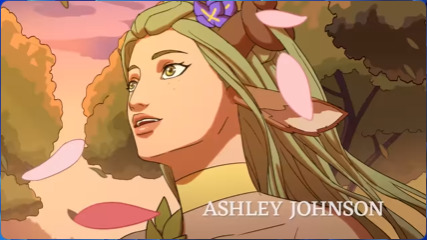
But I want you to take note of the leaves here, because they are used to form a connection between her and Orym. The transition uses them, while it isn't a direct wipe transition (the leaf just flies close to mask an abrupt cut), it is framed as one. The name of that isn't important, though, what's important is the leaves. By being in both shots, they emphasise the relationship between the two characters. But where for Fearn they show off her sense of wonder, for Orym, they take on a very different meaning.
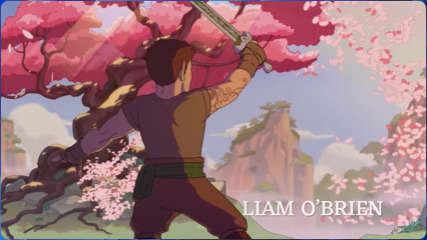
Notice, however, how still this shot is. There is no sense of danger here. This is a scene of a warrior with a sword and two people passing on from this world. But it's calm. Because this is a memory. Orym might not be at peace with the death, but the memory isn't a violent one, it's a memory of his family's lives.
Cut to a close up. Orym creates a gust of wind.
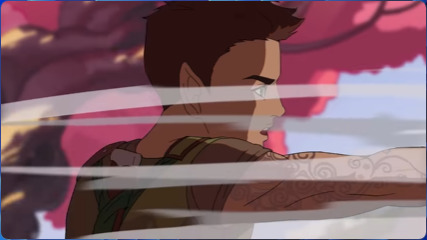
And cut to the next shot.
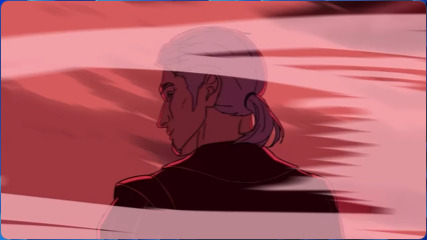
I will not lie, Bertrand is my favourite character across all of Critical Role, so this shot of him made me smile, but it isn't the point here. The point is Imogen's introduction.
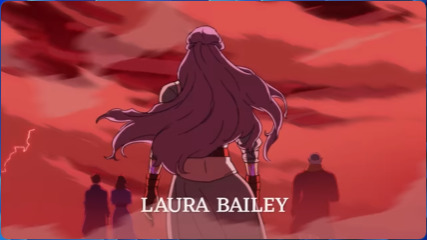
Although is Bertrand not actually the point? Because take a look at how Imogen is shown here. Do you notice anything?
She's shown in the exact same way. Imogen is shown doing the exact same thing that those who have died have done. And she can see them ahead of her. The camera panning back shows a wider perspective here, showing her as she tries to run, tries to get away from the same path as Bertrand.
The wind from Orym's blade that came to this scene gets across a consistent element: Memory. This is a dream. But dreams can become nightmares.
As Imogen loses her footing, the camera gives some of its wildest movements yet. It tumbles around her, then looks up.
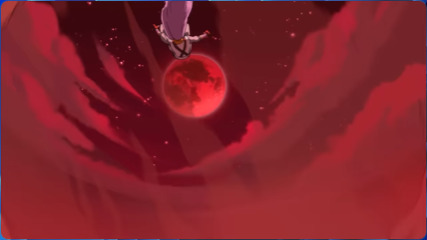
The camera stops moving when it sees the red moon, because now the viewer has something to orientate themselves around. There is a constant point, and we can see Imogen falling down. And getting closer, and closer, and closer, until.
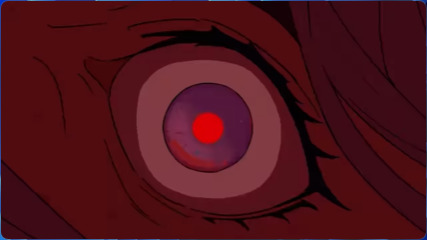
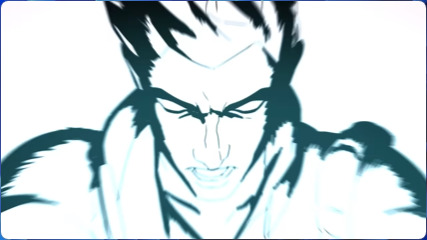

These are the three frames in order, there is nothing in between.
Imogen crashes into the screen, and we get an abrupt impact frame (that's the black and white one) then Ashton. This is so cool to watch, in my opinion, but it is quite possibly the opposite of smooth in camera work. So why is it so cool? Motion.
The motion is in towards Imogen and out away from Ashton. They are both falling, just in different directions. And the impact frame both helps smooth over and accentuate the abrupt transition.
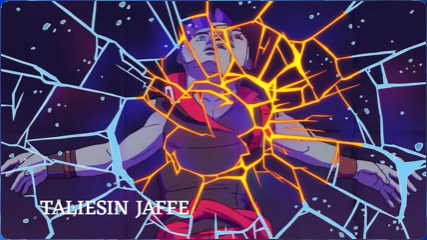
The camera around Ashton is a tracking shot. They are falling, but they remain the exact same in the screen (shrinking slightly). The rest of the world moves. And when Ashton lands, the screen cracks. The tracking shot is used to show Ashton's disassociation with their surroundings. Not in a "I feel nothing" type of way, but in a "it's me vs the world" type of way.
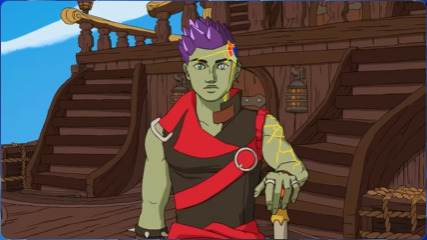
Then, there is an abrupt cut away. Nothing hides or smooths this at all, because Ashton's memory isn't smooth, and neither is Ashton. Remember the disassociating thing I mentioned, now it changes again to someone who gets lost in his thoughts. Medium.com calls this an "anxiety stare" and as someone who does that on the regular, I can attest to this abruptness being exactly what that feels like.

I'm not going to talk too much about the ship, but just be aware that there is a Dutch angle (the horison is diagonal) here to heighten the stress of it.
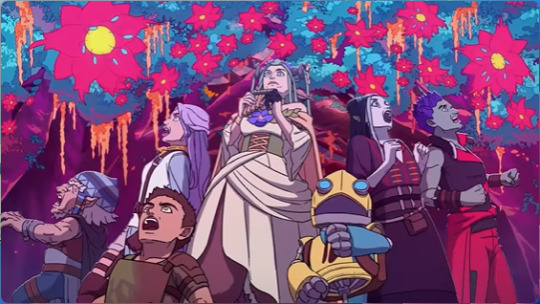
Likewise with this shot, there isn't much to talk about. The slow outward zoom and triangular composition are neat, and the tiered reactions (bottom row reacts, then middle, then Fearne) are amusing, but other than that, not much.
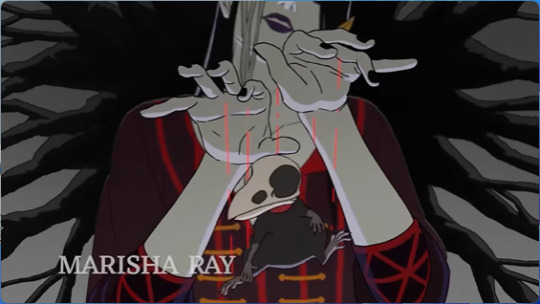
Then we meet Laudna, playing with Pate and giving him life. That's a neat little shot, I wonder if there's a metaphor there.
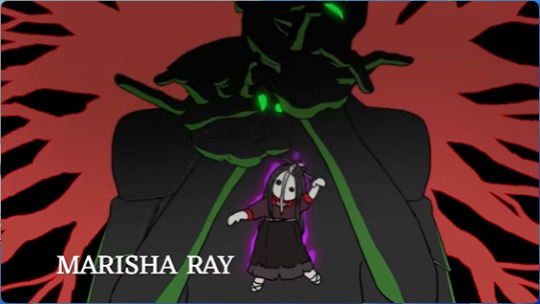
Oh.
This is a super cool visual because it establishes exactly who this character is in two seconds. But I also want to point out the symmetry of this. The hair becomes the blood which becomes the hair again, and then the tree.
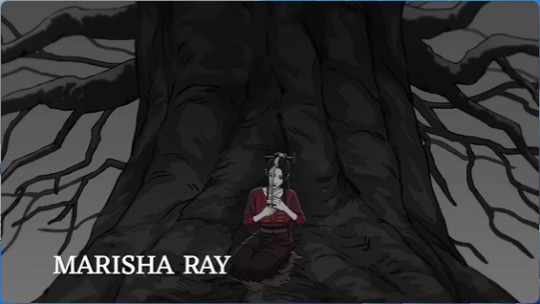
Laudna is introduced as big and scary and imposing, and that is very intentionally undercut by making her look small.
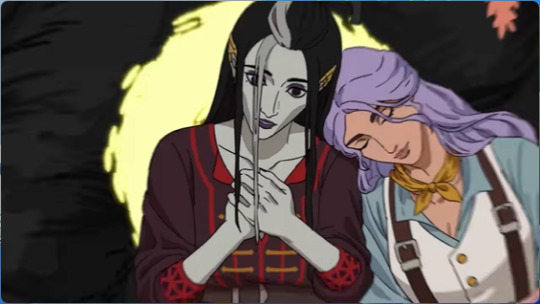
Being small means you are less likely to be the focal character, so shrinking Laudna takes away her agency. Only to give it back through Imogen, and when the camera pans back outwards, Laudna is the same size, but the colours and the surroundings make her feel less alone, and as a weird result of that, less small.
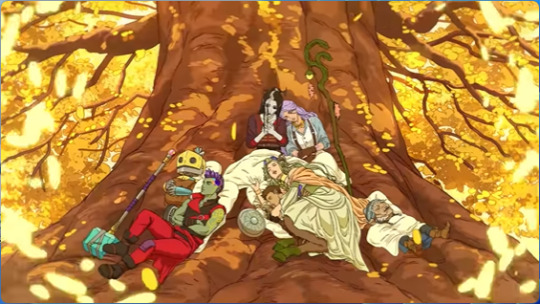
And last but not least in this moment, there is the delayed drop of the hands. Laudna finally feels safe and finally breathes a sigh of relief.
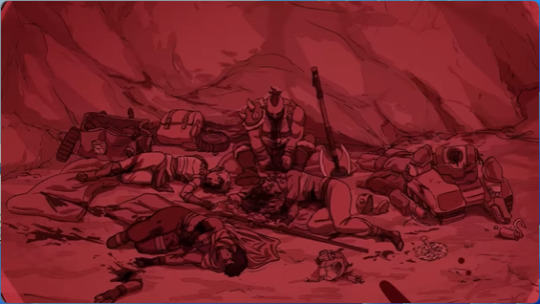
That, however, imediately match cuts to this. FCG's vision. The red tinting has obvious implications that I don't need to explain, but the match cut heavily implies a connection between this group and the Bells Hells. There is a fear that this might happen again made clear by a single transition.
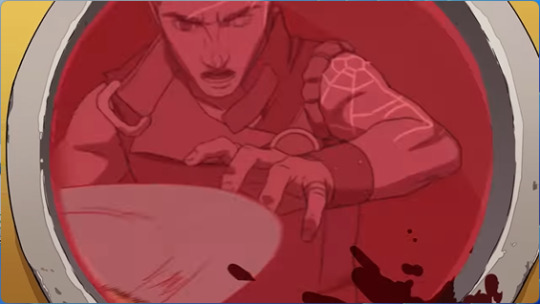
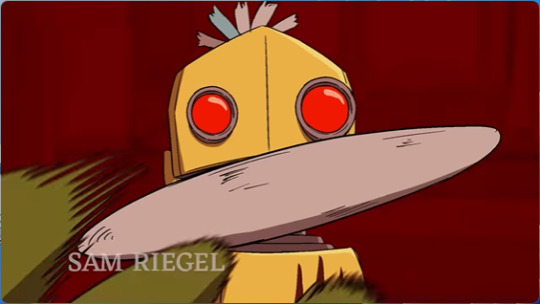
Here's something else. FCG doesn't move. At least, the camera doesn't treat them as moving. It's a slow panning out as if nothing is happening. It's the disassociation vibe that you get from Ashton's falling shots now repurposed to someone who isn't in control of their own actions. This is what FCG is afraid of, this is the important pieces of his character. This is FCG.
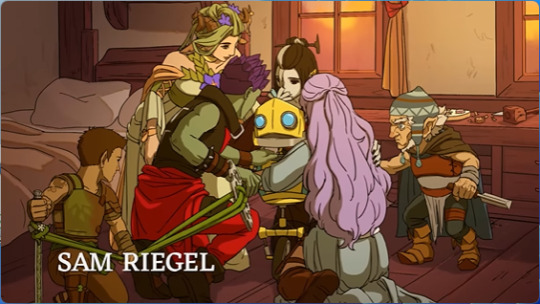
And just like Laudna, FCG finally gains agency when surrounded by their friends who hug them, and FCG finally moves.

Chetney Pock O'Pea, outlaw of the RTA, alpha of his own heart. A fundamentally chaotic character who takes rules as suggestions to be intentionally ignored. A man who's first instinct upon meeting you is to consider how you could be killed. And he is introduced whittling, with a steady camera and warm light illuminating his face. This is a peaceful side of Chetney, there is a duality to him.


Speaking of which, notice how Chetney draws back from the light as he transforms. His eyes begin to glow, but they don't illuminate him, until this:

Chetney is now backlit by the cold light of the moon itself (There's a neat reveal of Ruidus caused by the pan, but that's only tangentially relevant). Notice how much further you are from him here than in his first shot. But notice how much of him is visible, and how much of the screen he takes up. It's the same, this is still the same character. It's a true Doctor Jeckyl and Mr Hyde character. This isn't split personality, but a character who can be a different person in each form, while still remaining Chetney at all times.
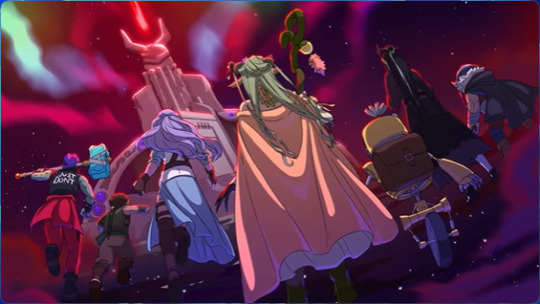
There is more in this video. I encourage you to watch it, but unfortunately, Tumblr has a limit on how many images I can include, so I will leave you with this final shot. A group of heroes looking up at a threat that is so much bigger than them, a threat that is literally controlling the light. But the Bells Hells are closer to the camera, they take up more of the screen. The battle isn't lost, instead, it is just starting.
#rants#literary analysis#literature analysis#media analysis#critrole#critical role#bells hells#imogen temult#laudna#ashton greymoore#fcg#orym of the air ashari#fearne calloway#chetney pock o'pea#its Thursday night#critical role bells hells
516 notes
·
View notes
Text
To no one's surprise, I have more thoughts on Ashton's feelings about faith and begging for divine intervention and never receiving it, because... well, look at what's in their head.
I tend to take the view that the Luxon as a divine entity does not necessarily have conscious intent in granting divine favor; it is closer to a foundational force of reality, with the rather nebulous thought that might accompany a living entity associated with that kind of force. So not inert matter, but not exhibiting the will and motivated action that the Pantheon or even the Primordials do. The Primordials are closer, in that they are active, but I think they are less willful. This isn't particularly relevant to this discussion except as evidential comparison, though, so I digress.
What this view of the Luxon results in, in practice, is the bestowing of power by seemingly random chance. The beacons are where they are, and any movement of their worship or use is in the hands of mortals who convey that—whether that's the expansion of dunamantic arcana in Aeor and possibly the larger world in the Age of Arcanum, or the missionary efforts of the Kryn Dynasty, or simply one person passing it to someone with ill intent who exploits another worker to expand its use and turn it into a weapon instead.
And what happens is that these smaller exchanges create ripple effects, and the path of this force being conveyed continues, which is how it has come to Ashton—by a series of circumstances that, when looked at individually, look like mundane random chance, but taken as a whole, are so unlikely that they seem meaningful in the end.
I think this gets to the heart of what the Luxon seems to rule—the world may be governed by chance and circumstances, but when those circumstances are accumulated—into an event, or a nation, or a life—they create not destiny but meaning.
Ashton's circumstances are a series of misfortunes that feel almost fated in how perpetual they are—when he spells out the course of his life, and says that he can count on his fingers how many genuinely good days he's experienced, the weight of that misery feels like an oppressive fate.
But within the amalgamation of that misery, they've also happened upon—one might say were bestowed with—power. This is the power that lets him decide to be a hero and decide to save his friends. And, by some accounts in Exandria, it would've been granted to them by a god, without even asking anything in return. It's not verbal, so it's not a concession or meant to be placating, which wouldn't do much in the long run—it's the means by which Ashton has been able to wield control over his own destiny.
So if there's any meaning to circumstance, maybe it means that when Ashton prayed, something already answered.
#this just in: marble tomes office of export controls actually just the missionary arm of the kryn dynasty.#luxon blogging#critical role#cr meta#cr spoilers#ashton greymoore#me: meta doesn't have to be super polished or formal stop worrying so much about it#also me: if I don't explain my methodology for this analysis I'll fucking die.
431 notes
·
View notes
Text
free my complex female character, she did the same thing as complex male characters but the fandom takes Any analysis of her actions/choices/motivations that doesn’t strip her of all of her agency in bad faith and claims that only misogynists would dare to critique the things that they’ve noticed in her character because she’s a woman, completely ignoring the over-presence of discourse about similarly traited male characters in their fandom.
#exhausted by people categorizing CRITIQUE. not even genuine hate just literally basic analysis of imogen’s character#as a) hate at all but b) misogynistic simply because… they assume the person like caleb and percy uncritically like#i love imogen and i love her because she’s riddled with complexity that gives reason for her to be unlikeable#the shit ashton says makes me want to tear out my hair and i could write analysis on why but they’re still one of my favourite characters#i enjoy caleb but watching him infuriated me because of his self interest which is a coherent trait of his but is a tiring one#similarly with percy of love his pretentious Smartest In The Room shit but sometimes it meant he treated others more poorly than necessary#but i’m not unpacking all of that just so i have some fandom mandated right to say that i think there’s an aspect of a female character#that is imperfect in the human sense#because like. i will continue to call imogen’s self interested until the world burns and the moon shatters. because she is.#the only reason her choice to do good is compelling at all is because the choice to do otherwise is so tangible#it isn’t a Mistake or Fault that she’s self interested. it’s by design#like. she reaches towards the storm in curiosity in her sleep. but then she fights back when she’s awake#that’s it#that’s the dynamic. that’s what’s compelling#but no ur right fandom. let’s instead all agree that imogen is actually just intrinsically good#and take away all agency and complexity and humanity from her#and instead slap a sticker of Morally Good and enjoy the caricature of her where she’s made to fit into the imagine of#the latest aesthetic ad for diarrhoea medication#imogen temult#critical role#inspired as always by dumbass twitter posts that i’m subjected to because of school n work#the worst part is i do like the laudna n imogen dynamic in the stagnancy where it is but so much of that fandom is so clear in their erosion#of both characters actuality to suit the picture of Ship Tropes#like fuckin. so much of imogen’s fanart in imodna making her fat which as a fat person great love to see it#not so much when it’s clearly to make her short n stout against laundas tall n lanky.#anyway
219 notes
·
View notes
Text
Hey, remember how in Exandria Unlimited Thordak's Cater in Emon was flaring and the Fire Ashari suspected something was trying to push through. And then a huge plateau burst up and on top of it was a massive burning purple-red sigil that was incomplete. (Exu:Prime E2)
Which Gilmore identifies as pre-Calamity magic of the lost civilization of Qoniira in the Rifenmist Peninsula jungle. (ExU:P E3)
Which the Crown Keepser subsequently found the hidden remaining city of Niirdal-Poc. There Elam Genar translated it as "place of burning." Tetrarch Thrascuur says the rune marks a place full of too much energy and ripe for creation and potential. Something deciding what it will be and dangerous. (ExU:P E6)
They head south to Niirdal-Sarqet where they find a floating cube with runes on it that they translate as:
The universe above
The universe within
Remember what came before
Decide what happens next
Provide for all
A shield to protect.
It breaks, and guardians attack. (ExU:P E7)
93 notes
·
View notes
Text
Imogen has so much rage inside. It’s not just from losing Laudna, but it’s from something else, something older, something that’s been stalking her for years. Many sleepless nights and nightmares plaguing her, where one might get relief from the horrors of the world, Imogen is plunged into a new horror. Imogen is tired, and without Laudna, she’s releasing it as rage.
Because with Laudna, she could feel safe, be vulnerable and voice her fears, but now she’s gone. And Imogen has decided that she won’t be afraid anymore. She can’t afford to be afraid, and so, instead of being afraid of the world, she angry at it. Angry because it’s taken everything from her. Her family, her dreams, her beloved. At every turn, the world strikes at her, hitting her where it hurts.
So, no more faltering, no more wavering, no more vulnerability. If the world is determined to scorn her, to slighter her with no mercy, over and over again, to hate her, then she will hate the world back. She will fight against it, fight against the fate it has thrust upon her.
The world is determined to steal everything away from her, and she has chosen to defy it. She will take back her life, she will bring Laudna back, and she will not back down or hesitate from anything else the world hurls at her. She’s fighting back.
#critical role#cr#imogen temult#critical role campaign 3#cr c3#critical role meta#critical role analysis#orringinal rambles
161 notes
·
View notes
Text
It's a very small thing, but from a sometimes DM's perspective, Chetney asking for the list of Novos's items is just...one of those things that separates the best D&D players from the rest of the pack. The DM creates the world, and often has a general storyline in mind, but the players are, ideally, driving the action. Railroading is a bit like murderhoboing, in that while you can have people who do it in bad faith, a lot of the time it happens because the players aren't invested enough in the world (or are too tied to a single outcome that cannot be guaranteed in a game of improv and chance), and so having players who are always looking for ways to expand the world and seek out the hooks themselves and connect with NPCs is truly what every GM wishes for.
Anyway, Travis is incredibly good at opening up these little optional avenues that he, other cast members, or Matt can pick up later and use in-game to guide the story. Maybe Bells Hells will decide they've got other priorities and the list will only serve to give us a tiny glimpse into who Novos once was, but that's still a small piece of the world we wouldn't otherwise have! Maybe it will be a fun moment of Bells Hells coming across an item down the road and make space for another interaction with the crew of the Crimson Abyss; maybe it will allow Matt to guide them towards some other important things they need to know for the Solstice plot. But because he asked for this silly list in earnest, those doors are all open in a way that feels organic and player driven.
#this is a whole massive discussion but like...there are some truly earthshatteringly good actual players#and i think that while many of them also make big flashy swings little stuff like this gets overlooked#anyway it really is like. look you do not need to like Travis's characters. i do obviously but you're entitled to dislike them#but if you do not think he is a player most GMs would kill to have at the table you're straight up bad at TTRPGs and media analysis#this is the player agency of which the prophets (twitter unfortunately) foretold in action#critical role#critical role spoilers
150 notes
·
View notes
Text
Thinking about this quote:
CR C1 E56 2:02:47
Kerrek: "You need to find a way to live with the fact that you do what you can, because that's what you can control. And sometimes bad things happen anyway, and so you just have to decide where you're going to pick your hill. You find your hill. Everybody gets one hill, and you plant your flag and you can die on that one. But you have to be careful, because you only get one. If you're really unlucky, you get more than one."
Keyleth: "And what if the ultimate problem is that I feel like I've had zero control from the start, since birth? I didn't want any of this. I didn't want my abilities. I didn't know I was special until now. And I so desperately just want to be normal. I want to go back to being ignorance and bliss."
And thinking about how Bell's Hells are the B-Sides. The NPCs who wandered into a story much much bigger than themselves and don't know what to do next. Some power fell in their lap. Chose them when they didn't want to be chosen. Radically altered their life.
And now suddenly the thing they were looking into, that crashed into them, has turned into one of the most important questions in Exandrian history: Do we need to save the gods from this threat?
We have Ludinus who's firmly in the "Fuck the gods" camp. We have the Loam and the Leaf who just don't want anything to do with the gods or their followers. We have Vassleheim who will protect the gods at all costs. And we have Bell's Hells who are mostly grappling with whether this should be their responsibility.
Team Wildmount have been contacted by gods demanding they save them.
Orym isn't exactly pro-gods, but he's against Ludinus and his followers. Team Issylra is really grappling with whether the gods have done enough good for the world to be worth protecting. They're seeing the harm of the worshipers whose mortal actions give the gods their power.
The conclusion they're coming to is that this is simply beyond their power to defeat Ludinus and this is out of their control. Their new goal is to get their people out of this shit show and get out. Survive this. Not defeat it. Not heroically save the day. Survive. If the path to that goal means saving the gods, fine. But fuck them they don't have priority.
I think that's a really cool story. A conceit of D&D as a game is that you are strong enough to be the heroes. It's nice to see that challenged.
#critical role#Critical Role Campaign 3#CR C3#Bell's Hells#Critical Role meta#Critical Role analysis
13 notes
·
View notes
Text
Thinking about how at their core both Ashton and Percy are emotionally stunted adults who need to be the only adult in the room because they never got a chance to properly grow up due to childhood trauma. Especially the way they are so different in so many ways but that one core detail dictates so much of their actions and leads to a lot of their failures. It’s just fantastic character building, I love how deeply flawed both of these characters are.
I swear no matter how many times Taliesin gives one of his characters that trait it gets me every time
#I will say I have seen less of campaign three than campaign one so my analysis doesn’t have all the information#critical role#bells hells#vox machina#ashton greymoore#percy de rolo
124 notes
·
View notes
Text
Critical Role's Previous Cameraman
I put up a post the other day about critical role's new animated introduction and I couldn't help but notice a sudden spike in the analytical stuff that I don't really understand. A more tech orientated friend of mine informed me that this was a good thing, actually. So, I thought I might capitalise on that and examine the previous campaign's opening sequence through the same lens and do some more analysis.
Let me explain.
SPOILERS AHEAD

One notable thing about this song is when it starts. Exactly eleven seconds in. That's eleven seconds of wait before the final payoff. You catch glimpses of what's happening above, but nothing else.
And that is a key theme of this campaign. The unseen. The Mighty Nein was a party characterised by trauma, and a lot of the time, you don't see that, you only see glimpses. A flash of a fight they told you about, and the sensation of drowning.
But then we meet Fjord.
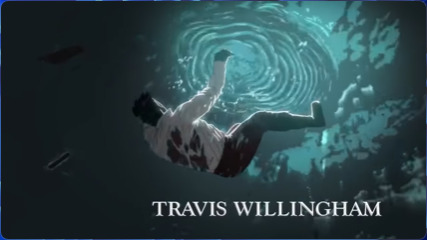
He's falling, and I'd like to point out the direction in which he is falling. You will notice the scars on his back, signifying he was probably in the process of running away, or was betrayed by someone, and he is falling towards those scars. Backwards. There is also a neat thing of falling away from the light, into the darkness, into the unknown. THis is someone out of control, leaning into the pain. And what is it that sees that?
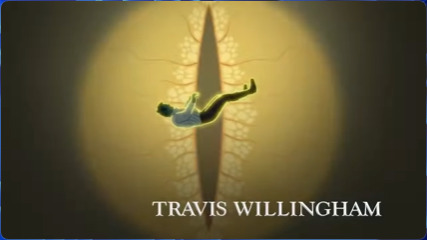
There is a reason Uk'otoa's design looks so much like a leach. The creature is a parasite, it doesn't find someone strong to break down, it found someone weak, and at its mercy, and brought him under its control. What this shot does is highlight that creature's opportunistic nature, but it also associates it very clearly with the visual of that eye.

And it's that eye that carries through. When Fjord washes up on the beach, when he is finally safe, he carries with him a little piece of Uk'otoa, a little piece of that trauma.
It's also notable of that it is an eye. It's obvious, but it colours his vision, and changes how he views the world. Its effects aren't physical, but mental.
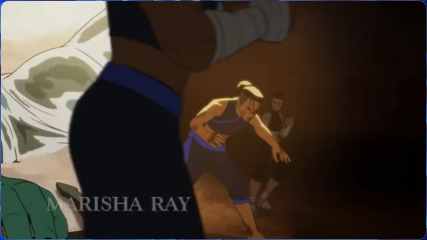
Beaureguard Lionet is a fighter. Not in the sense of class, because she isn't but in the sense of personality. Beau is a fighter in the sense that her first reaction to any problem is to punch it.
This transition is a wipe transition, but its important because of what it uses. It uses the opportunity to show off the uniforms of Beau's attackers, because otherwise the shadows of the rest of the shot make them hard to make out. These are wearing the same robes as her. Whoever they are, they are part of a team of some kind with her, they are people she should be able to trust, but look at how much damage they have done to her. Look at how heavily she is breathing. And look at what Beau does in response.

She fights back. This is how the animation gets across this character. She isn't complex, she doesn't need a great explanation, she doesn't have different sides to her, she just hits things until they stop being a problem.
I will also point out her eyes again. They are blue, not an unnatural eye colour, but they are the same blue as her robes, and the robes of those who are attacking her. Once again, the has warped the vision of its recipient, and in this case, it's creating a cycle of violence as all she knows how to do, is hit things.

We don't see Nott The Brave for a while in this animatic. We instead see, once again, the eyes. But I also want to point out that this was made before we knew about Veth. So we were just seeing the scared goblin.

This is as close as we get in this scene, and its Nott actively hiding from the light. The warmth scares her, and for good reason, its the same heat that we see emanating from her eyes. Once again, the trauma that has contaminated a character's vision is changing their reactions to the world.
And with that, I would like to talk about Jester, and I would like to do that in context.

The term "foil" in the context of a character was actually popularised by William Shakespear, who handily explained the metaphor for us.
"And like bright metal on a sullen ground,
My reformation, glitt'ring o'er my fault,
Shall show more goodly and attract more eyes
Than that which hath no foil to set it off."
Put in English, I shine brighter when you have something to compare me to. And this is what a foil character is, a character who brings about elements in other characters that can easily be missed, or who shows off by contrast their personalities.
Jester is one of the two characters in the Mighty Nein who is not a child of trauma, and her introduction shows that. She reacts to her life by laughing, and contrast that with everyone else. Fjord reaches for a sword, the item of his trauma; Beau tries to fight her trauma despite that approach clearly not working; and Nott hides from it, unable to reach out for help.
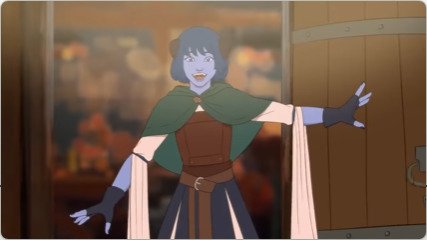
And it is notable that the first time we see an adult Jester, she looks normal (if a bit over cheerful), then is immediately contrasted with the rest of the Nein.
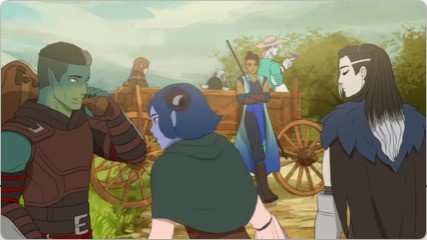
This not only shows just how different her demeanour is from the rest of the crew, but it shows her effect on them. She makes them all smile. Jester and Caduceus are very much support characters in the truest sense of the word. They support others. Jester shows genuine kindness towards everybody else, and it reflects onto them.

This shot is neat but not too special. Its a tracking shot on the hat of all things, because thats what important here, and it shows the traveling dynamic of the group. It's a tiny bit of tension in an otherwise calm scene, so the camera is steady, but speeds up slightly to match the movement of the object, then comes to a stop when it is caught. There is very little stress, but there is a sense of comradery.

Similarly, this shot establishes some stakes with a rising pan to show the scale of the threat and to show some more information, but it is hardly a monster, so the camera isn't really in a hurry.

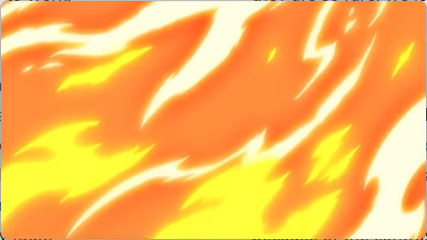
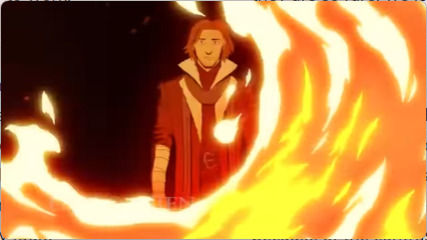
Enter Caleb Widogast, born in fire. I don't think they could write a more thematic entrance if they tried. An abrupt cut shows the night, then it is entirely consumed by fire, only to reveal Caleb.
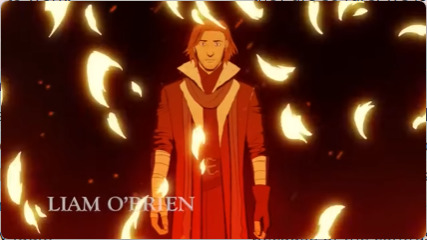
There is no motion here. The camera is stock still. This is the exact same thing with Ashton and FCG in the Bell's Hells. Caleb is disassociating from the heat in front of him, and there is a fascinating reason behind that. Caleb has two characters that need to be introduced to better understand him, the man, and Bren, the boy.
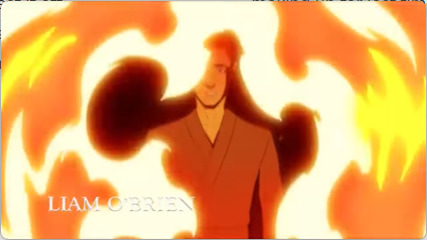
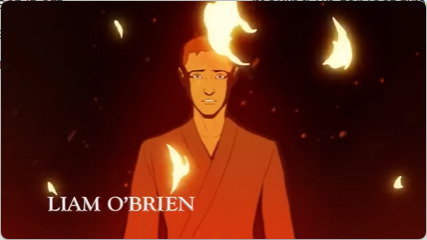
The flames consume the screen again, and then part to show a boy, staring at the screen, in horror. This is what you need to know about this character, this is a character forged in flames, born from the Ashes. Bren is dead, Caleb Widogast remains.

And this shot, with Caleb, Astrid and Eadwulf silhouetted against the fire, shows what kind of trauma we are talking about, and what effect it has. This is guilt, and in contrast with the rest of his party, this guilt is paralysing.
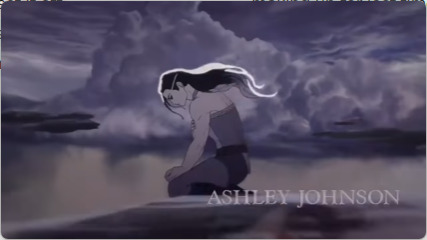
Yasha, however, is introduced in a calm way, in contrast to everything around her. The camera shows you a woman, meditating, and then pans backwards to reveal this:
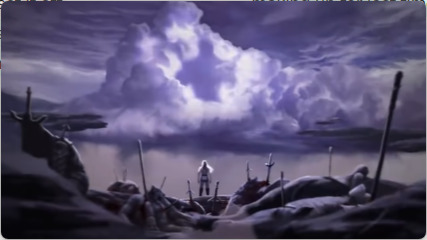
This is a woman surrounded by bloodshed, who has made a concerted effort to look away from it, and to look to the Storm Lord for guidance. This is a woman looking for healing, in comparison to everyone else, but that looking doesn't change the fact that that trauma is still there.
The next few scenes are cool, but don't really add anything to this analysis and I only have a few more images I can show here, so I'm going to skip to Taliesin's characters.
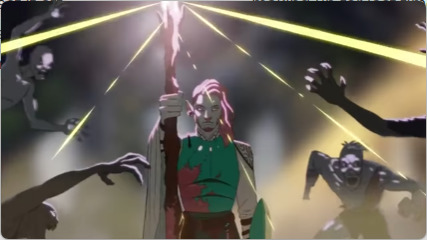
Caduceus has two introductions. One is this shot, which is a cool action shot of him casting an epic spell and vanquishing a crowd of enemies. But instead of the incredibly animated (in the sense of exaggerated poses) nature of his companions, Caduceus clay is calm and collected. He is unquestionably the anchor of the group, and where Jester contrasts them emotionally, Caduceus does so on a philosophical level. Caduceus is a gardener of fungus.

Mushrooms and other fungi are recyclers, they grow on dead trees and creatures and give a forest new life. They clear out the debris and make way for new things to take hold. That's what Caduceus does for the Nein, he helps them get through their trauma so that Jester can help them improve and become better.
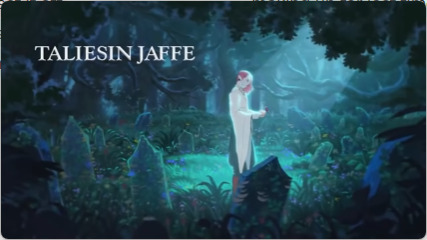
Caduceus's actual introduction is muted, and there's a point to that. He's not trying to be the main character, you don't need to understand his family life to understand him. You need to understand that can stand in a graveyard and see the light, that he is at peace with what has gone before him and helps people to get past it, and that his entire mission, to regrow the grove, isn't to bring back what is lost, but to help regrow something new in its place instead of the blight that lingers there.
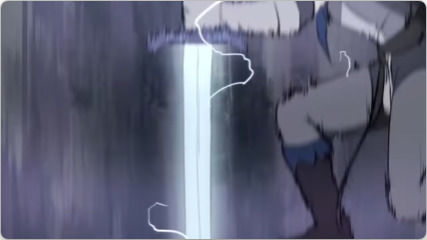
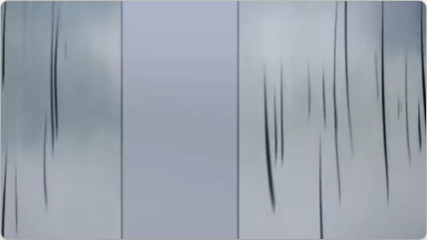
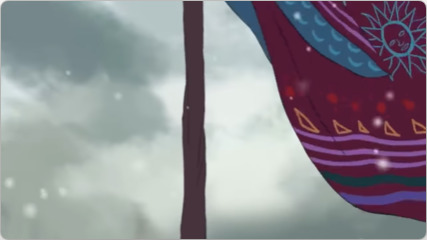
Mollymauk is introduced as a weapon transformed into a grave. That is what this transition is and I think that's really important. Mollymauk is, very clearly, a repurposed soul. He isn't the first person to inhabit that shell, and he isn't the last. I also want to point out how this character is represented here, not with a heroic memory, but with a quiet moment or remenicing on times gone by. He is a shadow that haunts the Nein.

This is by far the simplest shot in the entire video, and that's because it isn't telling you anything. You bring your own emotions to the table here, you bring the memories to the grave, that's how grieving works.
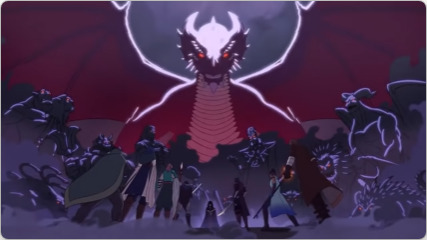
Once again, there is more to this video, but I'm only allowed to put 30 images in a single post. So I leave you with a quote from Niel Gaiman.
"Fairy tales are more than true: not because they tell us that dragons exist, but because they tell us that dragons can be beaten."
DnD likewise, and all TTRPGs for that matter, are powerful because in them, with a little bit of help from friends, any monster, no matter how personal, can be defeated.
#rants#literary analysis#character analysis#literature analysis#what's so special about...?#critical role#critical role campaign 2#the mighty nein#mighty nein#caduceus clay#cr caduceus#fjord stone#fjord cr#beauregard lionett#cr beauregard#nott the brave#cr nott the brave#veth brenatto#veth the brave#mollymauk#yasha#caduceus#beauregard#nott#jester lavorre#beau#jester critical role#caleb widogast#caleb critical role#yasha nydoorin
177 notes
·
View notes